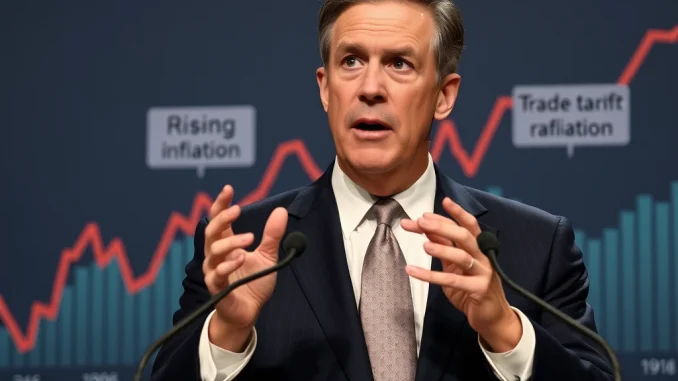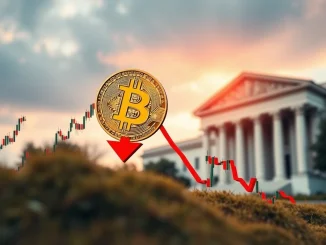
Buckle up, crypto enthusiasts and market watchers! Federal Reserve Chair Jerome Powell has just dropped a significant hint that could ripple through all markets, including crypto. His recent statements highlight a growing concern: tariffs might be a bigger driver of persistent inflation than initially anticipated. Let’s dive into what this means and why it matters for your investments and the broader economic landscape.
Why Jerome Powell is Sounding the Alarm on Tariffs and Inflation
In a recent address, Jerome Powell, the head of the Federal Reserve, expressed worries about the lasting effects of tariffs on the U.S. economy. This isn’t just about temporary price bumps; Powell suggests we could be looking at a more entrenched inflationary environment due to these trade policies. Here’s a breakdown of his key points:
- Larger Impact Than Expected: Powell indicated that the economic consequences of tariffs might be more substantial and long-lasting than previously assessed by the Fed.
- Inflationary Pressure: He explicitly stated that tariffs could trigger temporary inflation. The crucial point is preventing this temporary inflation from becoming a long-term problem.
- Commitment to Stable Expectations: Powell reaffirmed the Federal Reserve’s dedication to maintaining stable inflation expectations. This is a core part of their mandate to ensure price stability and economic health.
This warning from a figure as influential as Jerome Powell is significant. It signals a potential shift in the economic narrative and could influence future monetary policy decisions. For those invested in or following the cryptocurrency markets, understanding these macroeconomic shifts is crucial.
Tariffs and the US Economy: A Deeper Look
To grasp the gravity of Powell’s warning, let’s delve into how tariffs can fuel inflation and impact the US economy:
| Mechanism | Explanation | Impact on Inflation |
|---|---|---|
| Increased Import Costs | Tariffs are essentially taxes on imported goods. These taxes are often passed on to consumers in the form of higher prices. | Directly contributes to higher prices for imported goods, increasing overall inflation. |
| Reduced Competition | Tariffs can reduce competition from foreign producers, allowing domestic companies to raise prices without losing market share. | Leads to less price pressure and potentially higher prices for domestically produced goods, further fueling inflation. |
| Supply Chain Disruptions | Tariffs can disrupt global supply chains, making production less efficient and more costly. | Increased production costs can translate to higher consumer prices, adding to inflationary pressures. |
| Retaliatory Tariffs | When one country imposes tariffs, others may retaliate with their own tariffs, leading to trade wars and broader economic disruptions. | Widespread tariffs can significantly disrupt global trade, leading to higher prices and economic uncertainty, exacerbating inflation. |
As you can see, the impact of tariffs is multifaceted and can create a complex web of inflationary pressures throughout the US economy.
Jerome Powell’s Stance: What Does it Mean for Monetary Policy?
Powell’s comments are not just economic observations; they are strong signals about potential future actions by the Fed. Here’s what to consider:
- Heightened Inflation Awareness: The Fed is clearly paying close attention to inflation risks stemming from trade policies. This heightened awareness is crucial.
- Policy Adjustments: If tariffs do lead to persistent inflation, the Fed might need to adjust its monetary policy. This could involve measures like:
- Interest Rate Hikes: To combat inflation, the Fed might raise interest rates, making borrowing more expensive and cooling down the economy.
- Quantitative Tightening: Reducing the Fed’s balance sheet can also help to tighten monetary conditions and curb inflation.
- Balancing Act: The Fed faces a delicate balancing act. They need to control inflation without stifling economic growth. Powell’s statements suggest a growing concern that tariffs are making this balancing act more challenging.
Impact on Cryptocurrency and Financial Markets
So, how does all of this connect to the cryptocurrency world and broader financial markets?
- Inflation Hedge Narrative: Inflation is often cited as a key driver for cryptocurrency adoption, particularly Bitcoin, which is seen by some as a hedge against inflationary pressures. Powell’s warning about tariff-induced inflation could strengthen this narrative.
- Market Volatility: Uncertainty about inflation and potential Fed responses can lead to increased market volatility across all asset classes, including cryptocurrencies. Expect potential price swings as the situation develops.
- Dollar Strength: If the Fed takes a more hawkish stance to combat inflation (e.g., raising interest rates), it could strengthen the US dollar. This can have mixed effects on crypto, sometimes leading to capital outflows from riskier assets like crypto into the dollar.
- Economic Slowdown Concerns: Aggressive measures to combat inflation could also trigger concerns about an economic slowdown or even recession in the US economy. This risk-off sentiment could negatively impact both traditional and crypto markets.
Actionable Insights: Navigating the Tariff-Induced Inflation Landscape
What should you do with this information? Here are some actionable insights:
- Stay Informed: Keep a close eye on economic news, especially statements from the Federal Reserve and data releases related to inflation and trade.
- Diversify Your Portfolio: Diversification is always a good strategy, especially in times of economic uncertainty. Consider a mix of assets to mitigate risks.
- Assess Risk Tolerance: Understand your risk tolerance and adjust your investment strategy accordingly. Volatile periods may require a more conservative approach.
- Long-Term Perspective: Remember that economic cycles are normal. Maintain a long-term perspective and avoid making impulsive decisions based on short-term market fluctuations.
Conclusion: A Critical Juncture for the Economy
Jerome Powell’s warning about tariffs and inflation is a critical signal that we are navigating a complex economic environment. The potential for prolonged inflation due to trade policies presents challenges for the US economy and financial markets, including the cryptocurrency space. Staying informed, adapting your strategies, and maintaining a long-term view will be key to navigating these uncertain times. The Fed’s response and the evolving trade landscape will be crucial factors to watch in the coming months. Will Powell’s alert lead to a significant shift in economic policy? Only time will tell, but being prepared is paramount.



